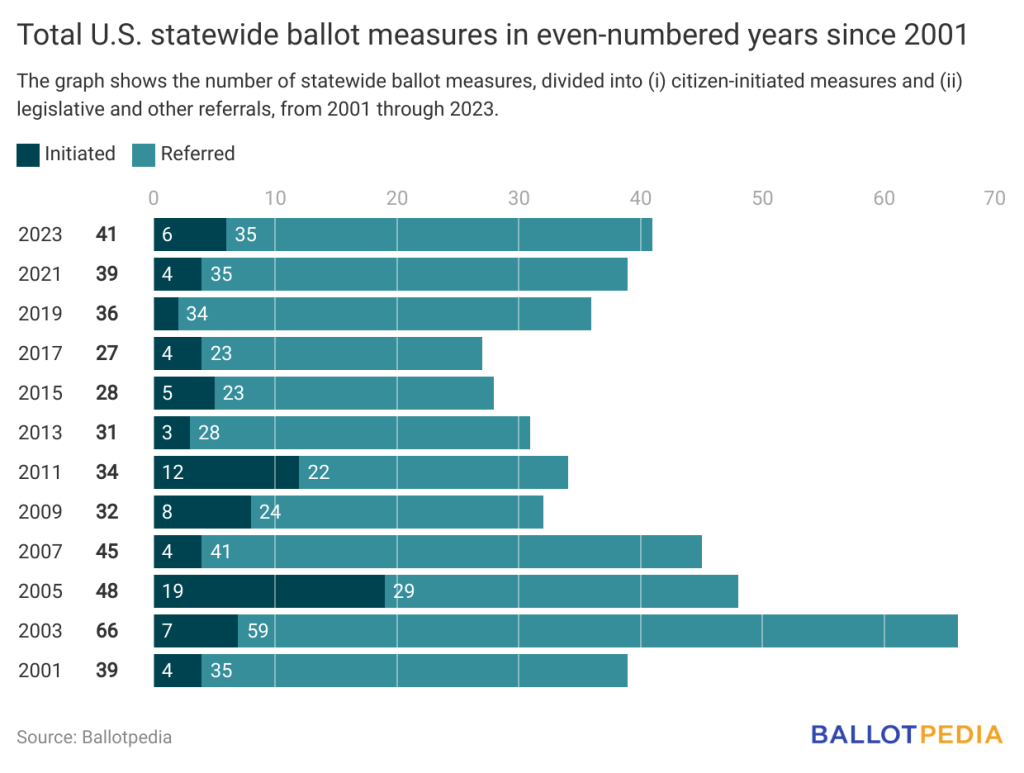In 2023, voters in eight states decided on 41 statewide ballot measures—the highest number of state ballot measures for an odd-numbered year since 2007. Voters approved 33 (80.49%) and rejected eight (19.51%). The average number of statewide measures on the ballot in odd-numbered years from 2011 to 2021 was 33.
- Between March and October 2023, voters in four states decided on nine ballot measures. Voters approved seven and rejected two of these measures.
- On Nov. 7, voters in five states decided on 28 ballot measures, including six citizen-initiated ballot measures (two in Ohio, and four in Maine). Voters approved 23 and rejected five ballot measures.
- On Nov. 18, the last statewide ballot measure election of 2023, voters in Louisiana decided on an additional four constitutional amendments. Voters approved three and rejected one constitutional amendment.
The approval rate for legislative ballot measures was 82.35% (28 of 34), while the approval rate for citizen-initiated ballot measures was 71.43% (5 of 7). During the last three odd-numbered years, the average approval rate for state ballot measures was 68.52%, including 84.00% for legislative referrals and 41.67% for initiatives. This year’s elections featured a higher-than-average approval for citizen-initiated ballot measures.

There were no state general obligation bonds on the ballot in 2023—the first time since 2011. Between 2011 and 2023, the average number of bond measures on the ballot was three.
In 2023, we saw two topics, in particular, continue trends from prior years.
- Abortion: In 2022, following Dobbs v. Jackson Women’s Health Organization, there were six ballot measures addressing abortion, including three constitutional amendments to establish a state constitutional right to abortion. Voters approved each one. In 2023, there was one—Ohio Issue 1, the Right to Make Reproductive Decisions Including Abortion Initiative, which was approved. You can learn more about this trend here: History of abortion ballot measures
- Marijuana: Heading into Nov., marijuana was legal in 23 states and D.C. Fourteen (14) of those 23 states had legalized marijuana through the ballot measure process. Voters in Ohio approved Issue 2, which legalized the recreational or personal use of marijuana in the state. About 49.07% of the U.S. population lived in a state where marijuana was legal before Issue 2. Approval of Ohio Issue 2 increased that percentage to 52.56%. Earlier in 2023, voters rejected an initiative to legalize marijuana in Oklahoma. You can learn more about this trend here: Marijuana laws and ballot measures in the United States
- RCV: While there were no statewide ranked-choice voting (RCV) ballot measures in 2023, there were local ballot measures. Voters in seven local jurisdictions decided on ranked-choice voting (RCV) local ballot measures in 2023. Voters approved the six measures to adopt RCV and rejected one measure to repeal the electoral system. You can learn more about this trend here: History of ranked-choice voting (RCV) ballot measures
Constitutional amendments
There were 32 constitutional amendments on the ballot in 2023. One was a citizen-initiated constitutional amendment, and 31 were legislative referrals. Voters approved 27 (84.38%) and rejected five (15.63%). The one citizen-initiated constitutional amendment was Ohio Issue 1, which voters approved.
The number of constitutional amendments in 2023 was the highest for an odd-numbered year since 2003, when 55 were on the ballot.
Voters approved three constitutional amendments addressing state constitutional rights in 2023:
- Louisiana Amendment 2, which provided that the “freedom to worship in a church or other place of worship is a fundamental right that is worthy of the highest order of protection.”
- Ohio Issue 1, which provided a state constitutional right to “make and carry out one’s own reproductive decisions,” including decisions about abortion, contraception, fertility treatment, miscarriage care, and continuing pregnancy.”
- Texas Proposition 1, which provided a state constitutional right to farming, ranching, timber production, horticulture, and wildlife management.
Campaign finance and spending
As of Dec. 8, Ballotpedia identified $169.48 million in contributions to support or oppose statewide measures on ballots in 2023, which was more than the previous three odd-numbered-year election cycles. The state to see the most campaign contributions was Ohio, where three measures were on the ballot. In Ohio, ballot measure committees received $107.15 million.
Ohio Issue 1, which created a state constitutional right to abortion and other reproductive matters, saw the most contributions at $71.60 million. Supporters received $41.71 million (58.25%) of that total, and opponents received $29.89 million (41.75%).
An aggregate of $12.95 million was spent on signature drives for the seven initiatives. That’s an average of $1.85 million per ballot initiative. The most expensive signature drive was for Ohio Issue 1 at $6.65 million. The least expensive was for Oklahoma State Question 820 at $75,341.
Readability
In 2023, Ballotpedia estimated the reading difficulty of ballot measures’ titles and summaries using two formulas, the Flesch Reading Ease (FRE) and Flesch-Kincaid Grade Level (FKGL). The formulas account for the number of syllables, words, and sentences in the ballot language, but not the difficulty or complexity of the ideas expressed in the ballot language.
In 2023, the average grade-level score for ballot titles was 19, which is about a third-year graduate school reading level. The average grade-level score for titles between 2017 and 2022 was 18. The average grade-level score ranged from 12 in New York and Ohio to 35 in Colorado.
The ballot measure with the highest grade-level score was Colorado Proposition II at 43. The ballot measures with the lowest grade-level scores were New York Proposal 1 and Ohio Issue 1 at 11.
Looking to 2024
As of Dec. 10, 2023, 56 ballot measures were certified for state ballots in 2024, which is higher than the average (51) at this point in the election cycle but below 2022 (64). Of the 56 ballot measures certified so far, 45 are legislative referrals, one is an automatic constitutional convention question, and 10 are citizen-initiated ballot measures.







